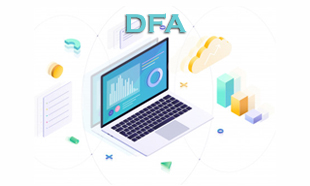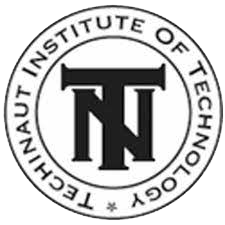In the ever-evolving landscape of finance and technology, the "Diploma in Financial Application (DFA)" course at SHREE RADHA KRISHNA INSTITUTE OF COMPUTER SCIENCE, a distinguished franchise of Techinaut Institute of Technology in Chandrapur, Maharashtra, stands as a beacon of knowledge. This six-month program is meticulously crafted to equip individuals with comprehensive skills in financial applications, blending technological proficiency with financial acumen. Let's embark on a detailed exploration of the course, unveiling its objectives and each section.
THE OBJECTIVE OF THE COURSE:
The primary objective of the "Diploma in Financial Application (DFA)" course at SHREE RADHA KRISHNA INSTITUTE OF COMPUTER SCIENCE is to provide participants with specialised knowledge in financial applications and technology. The course aims to bridge the gap between traditional financial practices and modern technological tools, preparing individuals for roles in financial management, accounting, and related fields. Through a holistic curriculum, participants gain hands-on experience with financial software and applications, making them adept at handling diverse financial scenarios.
SECTION 1: BASICS OF COMPUTER
The course commences with a foundational exploration of the basics of computers. Participants delve into the evolution of computers, understanding the components of a computer system and gaining insights into the role of hardware and software. This section ensures a solid understanding of computer fundamentals, laying the groundwork for the more specialised financial applications covered later in the course.
SECTION 2: COMPUTER APPRECIATION
Building upon the basics, the course progresses into computer appreciation. Participants gain an understanding of the role of computers in financial applications, appreciating their significance in streamlining financial processes, data analysis, and decision-making. This section sets the stage for a deeper technology integration in financial scenarios.
SECTION 3: WORD PROCESSING
Effective communication is vital in financial settings. This section focuses on word processing skills, emphasising applications like Microsoft Word. Participants learn to create and format financial documents, reports, and proposals, ensuring clarity and professionalism in financial communication.
SECTION 4: SPREADSHEET PACKAGE
Spreadsheets are fundamental tools in financial management. Participants explore spreadsheet packages in this section, focusing on applications like Microsoft Excel. Topics include financial modelling, data analysis, and using spreadsheets for budgeting and forecasting.
SECTION 5: PRESENTATION PACKAGE
Clear and impactful presentations are crucial in financial reporting. This section introduces participants to presentation packages, focusing on Microsoft PowerPoint. Participants learn to create visually compelling financial presentations, effectively conveying complex financial data to diverse audiences.
SECTION 6: INTRODUCTION TO THE INTERNET
As the financial landscape becomes increasingly connected, this section provides a comprehensive introduction to the Internet. Topics include understanding online financial resources, research, and utilising web-based financial tools. Participants explore online platforms relevant to financial analysis and decision-making.
SECTION 7: EMAIL COMMUNICATION
Email remains a cornerstone of professional communication. This section focuses on email communication in financial contexts, covering topics such as composing financial emails, managing financial correspondence, and utilising email for collaborative financial efforts.
SECTION 8: INTRODUCTION TO TALLY
Tally, a leading financial accounting software, takes centre stage in this section. Participants delve into the functionalities of Tally, including ledger management, voucher entry, and generating financial reports. Practical exercises ensure hands-on experience in using Tally for day-to-day financial operations.
SECTION 9: ADMINISTRATION IN TALLY
This section builds on the Tally foundation, exploring advanced features related to administrative tasks. Participants learn to set up and customise Tally for specific financial requirements, ensuring optimal use of the software in diverse financial scenarios.
SECTION 10: MANAGING GROUPS, LEDGERS, AND VOUCHERS
A deeper dive into Tally follows in this section, focusing on managing groups, ledgers, and vouchers. Participants gain expertise in organising financial data within Tally, facilitating accurate financial reporting and analysis.
SECTION 11: COST CENTRES AND COST CATEGORIES
Understanding cost structures is critical in financial management. This section introduces participants to cost centres and cost categories within Tally. Participants learn to allocate and track costs effectively, enhancing their ability to analyse and manage financial resources.
SECTION 12: INTRODUCTION TO BUDGETS
Budgeting is a fundamental aspect of financial planning. This section covers the budgeting principles within Tally, enabling participants to create and manage financial budgets for individuals, organisations, or projects.
SECTION 13: INTRODUCTION TO VOUCHER
Vouchers are key documents in financial transactions. This section explores the concept of vouchers within Tally, emphasising their role in recording financial transactions accurately.
SECTION 14: CURRENCIES
Understanding multiple currencies and foreign exchange is vital in an interconnected global economy. This section delves into Tally's capabilities in handling multiple currencies and managing foreign exchange transactions.
SECTION 15: INVENTORY INFORMATION
Inventory management is integral to financial control. This section covers the use of Tally for managing inventory information, including stock tracking, valuation, and reporting.
SECTION 16: VOUCHER ENTRY
Participants gain hands-on experience in voucher entry within Tally. This section emphasises accurate and efficient entry of financial transactions, ensuring the integrity of financial data.
SECTION 17: DISPLAYING INFORMATION FROM TALLY
The ability to retrieve and display relevant financial information is crucial. This section explores Tally's reporting features, empowering participants to extract valuable financial insights from the data recorded in the system.
SECTION 18: INTRODUCTION TO TAXATION
Understanding taxation is pivotal in financial management. This section introduces basic taxation principles within the context of financial applications, laying the groundwork for more advanced tax-related topics.
SECTION 19: INTRODUCTION TO PAYROLL
Managing payroll is a key responsibility in financial administration. This section introduces participants to Tally's features related to payroll management, covering aspects such as salary processing, statutory compliance, and generating payroll reports.
ASSESSMENT AND PROJECT WORK:
Participants undergo regular assessments throughout the course to evaluate their understanding and proficiency in each section. Practical projects form a significant component of the evaluation process, allowing individuals to apply their knowledge to real-world financial scenarios. This approach ensures a holistic assessment encompassing theoretical understanding and practical application.
INDUSTRY-RELEVANT SKILLS:
The DFA course at SHREE RADHA KRISHNA INSTITUTE OF COMPUTER SCIENCE is designed to impart skills directly relevant to the financial industry. Participants gain practical experience with Tally, a widely used financial accounting software, ensuring they are well-prepared for roles in financial administration, accounting, and related fields.
GUEST LECTURES AND INDUSTRY INSIGHTS:
The course incorporates guest lectures and insights from industry experts to provide a broader perspective. Participants have the opportunity to interact with professionals in the field of financial applications, gaining valuable insights into industry trends, best practices, and potential career paths.
CONCLUSION:
The "Diploma in Financial Application (DFA)" course at SHREE RADHA KRISHNA INSTITUTE OF COMPUTER SCIENCE, a Techinaut Institute of Technology Franchise in Chandrapur, Maharashtra, is a comprehensive journey into the intersection of finance and technology. By combining foundational computer skills with specialised knowledge in financial applications, the course equips individuals for success in the modern financial landscape. As participants complete the DFA program, they emerge with a diploma and the skills and confidence to navigate the complexities of financial management using advanced technological tools. Under the Techinaut umbrella, SHREE RADHA KRISHNA INSTITUTE OF COMPUTER SCIENCE continues to pave the way for individuals seeking to excel in financial roles by providing them with the knowledge and expertise needed to thrive in the dynamic world of financial applications.
Lectures = 130 HRS
Practical/Tutorials = 130 HRS
Total = 260 HRS
 DIPLOMA IN COMPUTER APPLICATION (MWCI)
1 × ₹13,000.00
DIPLOMA IN COMPUTER APPLICATION (MWCI)
1 × ₹13,000.00  COMPUTER TYPING (CDCO)
1 × ₹10,000.00
COMPUTER TYPING (CDCO)
1 × ₹10,000.00  COMPUTER TYPING (VITA)
1 × ₹3,200.00
COMPUTER TYPING (VITA)
1 × ₹3,200.00  DIPLOMA IN COMPUTER APPLICATION (VITA)
1 × ₹3,200.00
DIPLOMA IN COMPUTER APPLICATION (VITA)
1 × ₹3,200.00  ADVANCE DIPLOMA IN COMPUTER APPLICATION (VITA)
1 × ₹22,500.00
ADVANCE DIPLOMA IN COMPUTER APPLICATION (VITA)
1 × ₹22,500.00 

